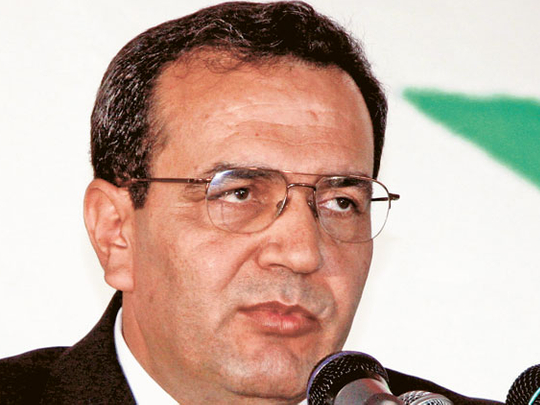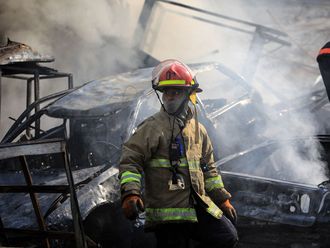
Beirut: Syrian President Bashar Al Assad on Saturday sacked the governor of Hama province, a day after tens of thousands of protesters massed in the provincial capital to demand the Syrian leader to step down.
The demonstration in Hama, scene of a bloody crackdown by Al Assad's father nearly 30 years ago, was part of nationwide protests which activists said were some of the biggest since the uprising against Al Assad's rule erupted 14 weeks ago.
The protests took place while Al Assad's troops, backed by tanks and helicopters, pursued a military campaign in the northwestern province of Idlib where a prominent rights lawyer said 14 villagers were killed on Friday.
Another 10 people were shot dead by security forces who confronted demonstrators in the central city of Homs, Damascus suburbs and the Mediterranean city of Latakia, activists said.
State news agency Sana agency said Al Assad issued a decree dismissing Ahmad Khalid Abdul Aziz, governor of Hama province, without giving details.
Armed uprising
Hama was the site of an armed uprising against Al Assad's father, Hafez Al Assad, who sent the army to crush the revolt in 1982. At least 10,000 people were killed and part of the old city was flattened in the military operation.
One month ago, activists said Syrian forces killed at least 60 protesters in the city, in one of the bloodiest days of the uprising against Al Assad. Residents said security forces and snipers had fired on crowds of demonstrators.
Al Assad has already sacked the governors of Dara'a, where the protests first broke out on March 18, and Homs, but neither move halted the momentum of protests in those provinces.
Al Assad has also promised a national dialogue to discuss political reform in Syria, and authorities say preliminary talks with the opposition will take place on July 10.
Prominent opposition figures plan to convene their own "national salvation" conference in Damascus on July 16 to reach a broad-based blueprint for solving Syria's political crisis.
"In light of the military solution chosen by the regime to end the revolution, the conference aims to reach a consensus guided by the popular protest movement for a transitional period and a national salvation government that lays the foundation for a new constitution and free elections," said a statement by the organisers sent to Reuters.
It was signed by 50 figures including Kurdish leader Mesha'al Al Tammo, former judge Haitham Al Maleh, Nawaf Al Bashir, a tribal leader from eastern Deir Al Zor province, economist Aref Dalila and Walid Al Bunni, a physician who took part in the Damascus Spring movement crushed by Assad ten years ago.
Rights groups say Syrian security forces have shot dead at least 1,300 civilians since the protests started and arrested over 12,000. Authorities say 500 police and soldiers have been killed by gunmen they also blame for most civilian deaths.
The United States and European Union have put sanctions on Al Assad and his top officials in response to the violence and last week the US Treasury Department said it imposed sanctions on Syria's security forces for human rights abuses and against Iran for supporting them.
US Secretary of State Hillary Clinton said on Friday the Syrian government was running out of time "to allow a serious political process" or face increasingly organised resistance.
In a report issued on Saturday Human Right Watch said government security forces and their allies killed 21 people in the last fortnight in Syria's third-largest city of Homs.












